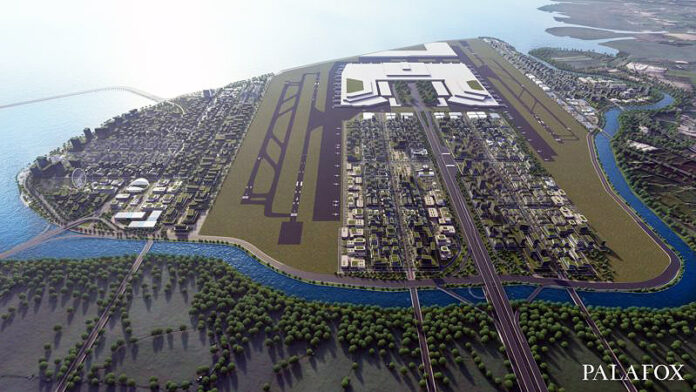
-
The Senate on March 18 gave its final nod to the bill creating the Bulacan Special Economic Zone and Freeport (BuZ)
-
Senate Bill No. 2572 establishes BuZ, which will host the 2,500-hectare P740-billion New Manila International Airport project by San Miguel Corp. in Bulakan, Bulacan
-
Senator Grace Poe said economic gains from the proposed BuZ could reach P130.9 billion and generate 800,000 to 1.2 million jobs for Filipinos
The Senate on March 18 approved on final reading the bill creating the Bulacan Special Economic Zone and Freeport (BuZ).
Senate Bill (SB) No. 2572 establishes BuZ, which will host the 2,500-hectare P740-billion New Manila International Airport project by San Miguel Corp. in Bulakan, Bulacan as key locator. The project began construction in October 2020 and features four parallel runways, a world-class terminal, and an integrated infrastructure network under a 50-year build-operate-transfer arrangement.
It also covers the remaining land territories of the cities of Malolos and Meycauayan, and of the municipalities of Bulakan, Paombong, Guiguinto, Balagtas, Bocaue, Marilao, Obando, and Sta. Maria, that are not yet included as component parts of the airport project.
Also included are all other expansion areas or municipalities, whose bounds shall be clearly defined through a Presidential Proclamation, within Bulacan and surrounding areas which may be declared as part of the BuZ.
A similar proposed legislation was vetoed by President Ferdinand Marcos, Jr. in 2022 due to fiscal risks and potential conflicts with other agencies’ mandates.
At the House of Representatives, a similar measure, House Bill 8841, has already received the green light.
“Throughout our collective brainstorming, we have crafted a vastly-improved bill that adheres to the constitutional provisions on land conversion, balances economic growth with environmental protection, and warrants greater local government unit (LGU) representation at its helm,” Senator Grace Poe, who sponsored the bill, said following the bill’s approval.
“It will spur investments, create more jobs and will be a model, not just here in the Philippines, but all over Asia,” she added.
Poe said economic gains from the proposed BuZ could reach P130.9 billion and generate 800,000 to 1.2 million jobs for Filipinos.
Under the bill, the BuZ will be developed into and operated as a “decentralized, self- reliant and self-sustaining, aviation hub, industrial, commercial, trading, agro-industrial, tourism, retirement, banking, financial and investment center, emerging and future technologies, with suitable residential areas.”
A corporation to be known as the Bulacan Special Economic Zone and Freeport Authority (BEZA) will be created to manage and operate the BuZ. BEZA will be under the direct supervision and control of the Office of the President.
BEZA will have an authorized capital stock of P2 billion, the majority shares of which will be subscribed and paid for by the national government and the local government units (LGUs) embracing the ecozone.
To ensure the efficient and sustainable development of the ecozone, the BEZA, in consultation with the National Economic and Development Authority, should come up with a general framework for land use, planning, and development for the area covered by the proposed ecozone. The framework should be consistent with the goals of the Philippine Development Plan.
The development of the BuZ should also be integrated and consistent with the plans of national government agencies, regional development councils, and LGUs with respect to transportation, telecommunications infrastructure and other facilities.
Members of the BEZA Board will include representatives of the Bulacan provincial government and LGUs, as well as a representative from the private sector and another to represent the workers in the BuZ.
The Department of Environment and Natural Resources will be tasked to lead the supervision of environmental concerns inside the ecozone, said Poe.
SB 2572 also enumerates the incentives to be given to enterprises and investors planning to set up shop within BuZ, including the grant of special visas, subject to relevant labor and immigration laws, rules and regulations, and fiscal incentives.
As for revenues, the BEZA and affected LGUs will be entitled to a share in the special corporate income tax under Republic Act (RA) No. 8424, otherwise known as the National Internal Revenue Code (NIRC) of 1997 as amended, from all registered business enterprises within the ecozone. The corporate income tax collected will be divided as follows: 40% to the national government; 20% to BEZA for infrastructure development; and 40% to the concerned LGUs.
Notwithstanding its autonomy, all transactions to be undertaken by the BEZA will be subject to the audit mechanisms under RA No. 10149, or the Government-Owned and Controlled Corporation Governance Act of 2011, as well as accounting and auditing rules of the Commission on Audit.




